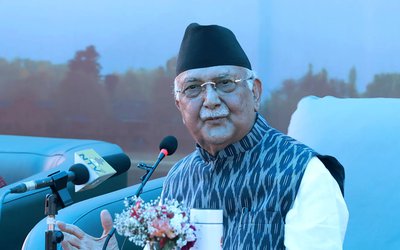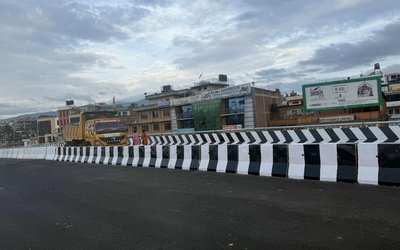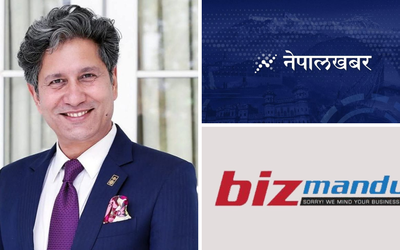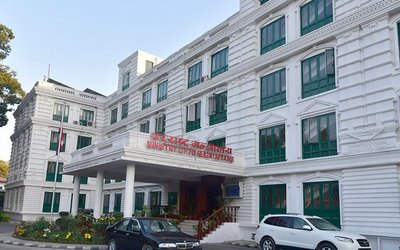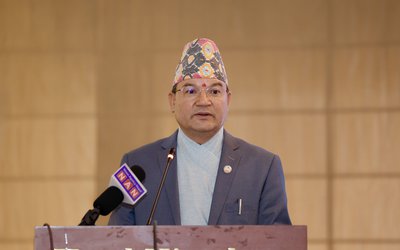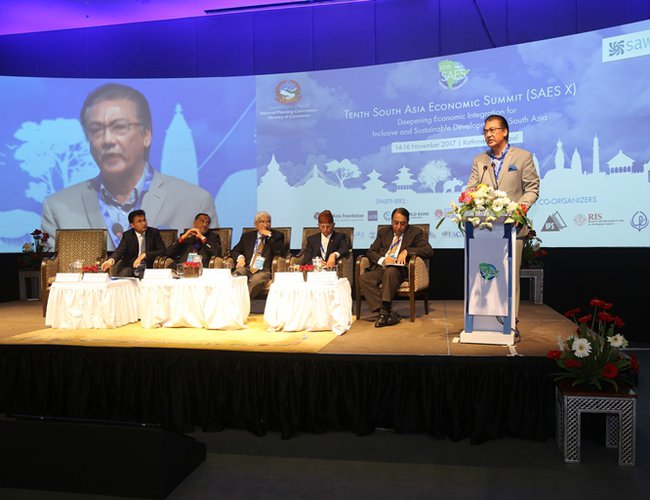
Thinkers from Across South Asia discussed ways to further integrate the region by deepening economic cooperation on Wednesday. They were participating in the tenth South Asia Economic Summit being held in Kathmandu since Tuesday.
The tenth summit is being organised jointly by National Planning Commission (NPC), Ministry of Commerce, Government of Nepal and South Asia Watch on Trade, Economics and Environment (SAWTEE) from 14-16 November in Kathmandu. The theme of the summit is 'Deepening Economic Integration for Inclusive and Sustainable Development in South Asia".
During a plenary session, titled "Whither SAARC? The Future of Regional Cooperation in South Asia", distinguished regional experts discussed ways to reinvigorate South Asia Association for Regional Cooperation (SAARC) so that the member countries can deal with poverty in a collective manner
Giving a keynote speech, Prof. Deepal Nayyar, Professor, Jawaharlal Nehru University, said that the near absence of economic engagement has left SAARC fragmented.
Rana Muhammad Afzal Khan, Parliamentary Secretary for Finance, National Assembly of Pakistan, said that intra-regional connectivity could also benefit from other regions such as China and Eastern Asia and cited the example of China-Pakistan Economic Corridoor.
Nazir Kabiri, Advisor to the Ministry of Finance, Government of Afghanistan, said that the extent of lack of cooperation among the countries that have such shared past is shameful.
Suraj Vaidya, President, SAARC Chamber of Commerce and Industry, pointed out that economic integration is not through trade but through investment and freer movement of people.
Dr Bishwambher Pyakuryal, Ambassador of Nepal to Sri Lanak and Maldives, called attention also to the rising subregional intiatives within the region.
Ambassador Dr. Dinesh Bhattarai, Advisor to the Prime Minister of Nepal, said that geo-political issues have paralysed SAARC making it a victim of its own complexities. The reasons behind the lacklustre performance of SAARC are security concerns.
The second day of the summit saw speakers divide into separate groups according to the fields of their expertise to deliberate on the different issues concerning economic cooperation. Ten such specialized sessions had been organized on Wednesday, apart from a plenary that brought all the participants to a brainstorming session.
One such session titled “Unleashing the Potential of Intra-regional Trade” saw regional speakers talking about the direction of current intra-regional trade, the likely hurdles and ways to overcome them. Similarly, the experts brainstormed the need to start opening up for intraregional investment just like they have done for bilateral investment through individual Bilateral Investment Protection and Promotion Agreement.
Similarly, experts discussed the need for improved information and communication technology, logistical infrastructure and payments solutions to promote eTrade in the least developed countries of South Asia during a session named ' Assessing eTrade Readiness in South Asia".
Besides these, similar sessions were organised on sustainable development, climate change, disaster preparedness, South Asian stance on WTO Ministerial, intellectual property for plant genetic resources, trade and transit facilitation and migration and remittance, among others.
About 300 participants, including renowned researchers, academicians, experts across various disciplines, government officials, diplomats from the region as well as abroad will be participating in 20 sessions over three days.
The South Asia Economic Summit was launched in 2008 as a platform to discuss and analyse development challenges facing South Asia. The annual event brings together regional experts from various fields from across the South Asian region.
South Asia Watch on Trade, Economics and Environment (SAWTEE), Nepal; Centre for Policy Dialogue (CPD), Bangladesh; Research and Information System for Developing Countries (RIS), India; Sustainable Development Policy Institute (SDPI), Pakistan; and Institute of Policy Studies of Sri Lanka (IPS), Sri Lanka – take turns to organize the annual event in one of the SAARC countries.
- MELAMCHI WATER SUPPLY: No Interruption During Monsoon
- Jun 25, 2025
- KOREAN RETURNEES: Successful Integration
- Jun 25, 2025
- UPPER TRISHULI-1: Engaging With Local
- Jun 25, 2025
- IME GROUP: Twenty Five Years Of Journey
- Jun 24, 2025
- NEPAL’S AIR POLLUTION: A Growing Health Concern
- Jun 24, 2025

